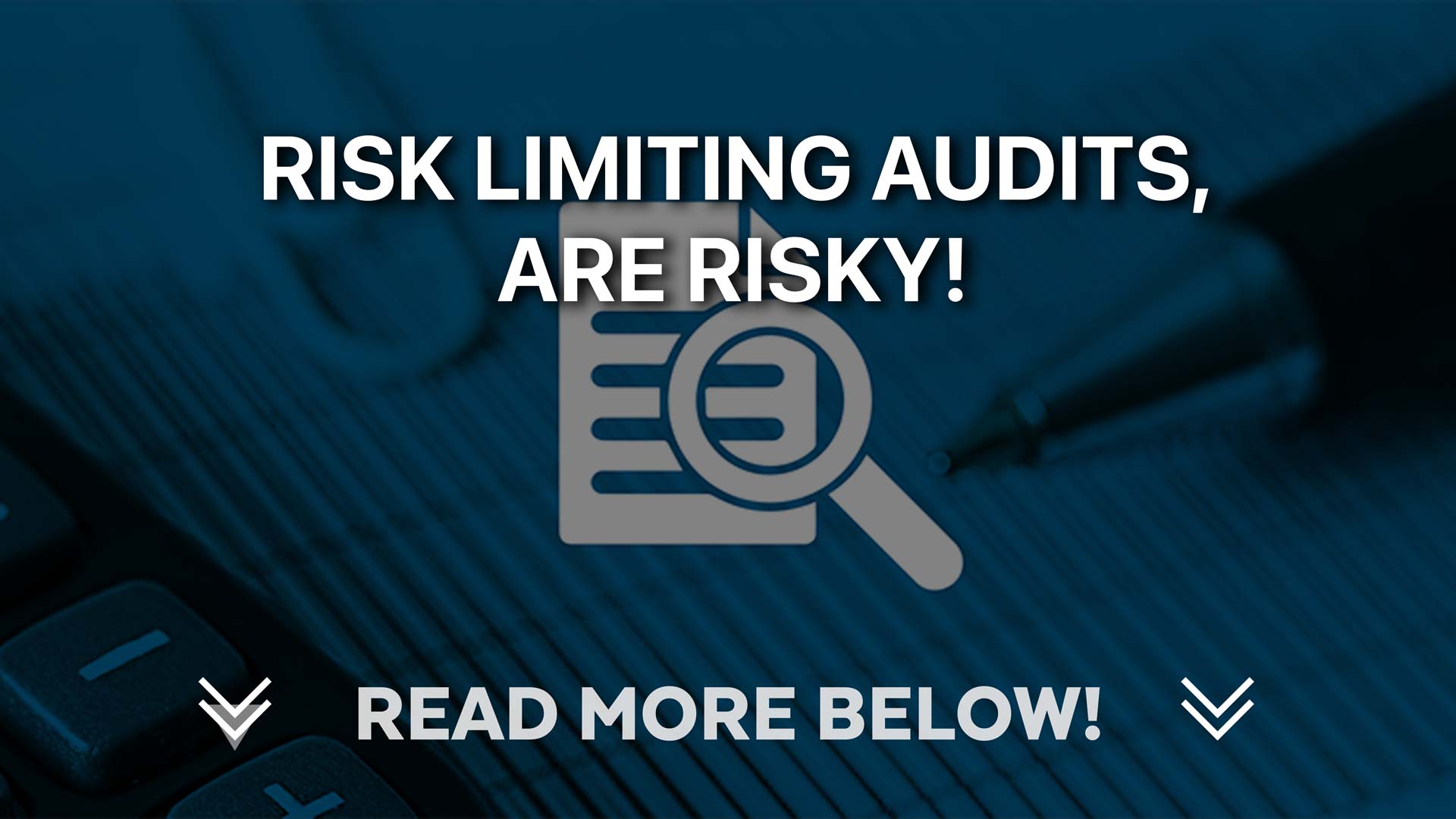So, as we’ve previously covered Eric Brownstain’s lies about the Election Group and the controversy surrounding TEG (aka the Elections Group), we feel it’s important to share with you the controversy not just surrounding TEG and its officers but also the primary audit function they promote: Risk-Limiting Audits (RLAs).
To get the background information on TEG, start here:
https://www.influencewatch.org/for-profit/the-elections-group
https://operationsunlight.com/2023/04/17/eric-brown-liar-or-loon
www.safeelections.org
https://democracyfund.org/idea/increasing-trust-in-elections-democracy-funds-election-validation-project
https://democracyfund.org/idea/knowing-its-right-limiting-the-risk-of-certifying-elections/
Okay, let’s get rolling into this. You may have heard of the prestigious Philip Stark; he is truly a smart and accomplished individual with numerous accolades that would require a full post to cover. You can find some of his achievements here.
What you may not know is that he is one of the pioneers behind Risk-Limiting Audits (RLAs). Jennifer Morrell, one of the founders of TEG, uses RLAs as one of her preferred methods to demonstrate the fairness and integrity of elections. However, one only needs to examine the instances where RLAs have been used, such as in Colorado (Tina Peters), Fulton County, Georgia (Herschel Walker), and Pennsylvania (Doug Mastriano), to quickly challenge the notion of fairness and justice. Now, stay with me, as this story concludes with a bang.
Critics of RLAs typically present the following arguments:
- They are too complex and expensive. They are not necessary to ensure the accuracy of elections.
- They can be manipulated by partisan actors. RLAs can be used to find fraud or errors that do not exist, if the auditors are biased or have a vested interest in the outcome of the election.
- RLAs only focus on auditing a small portion of the total ballots cast, which may not provide sufficient assurance of the overall accuracy of the election results. A larger sample size or a full recount would be more effective in detecting potential errors or fraud.
- RLAs can be complex to implement and may require significant resources, including time, money, and technical expertise. Costs associated with conducting RLAs might outweigh their perceived benefits and offer no real value in trustworthy findings anyway.
- RLAs rely on statistical methods and assumptions to determine the appropriate sample size and level of risk. These assumptions may introduce biases or uncertainties into the audit process, potentially leading to inaccurate or misleading results.
- Vulnerabilities to Manipulation, RLAs can be vulnerable to manipulation or strategic behavior by election officials or other actors. The selection of the audit sample or other aspects of the RLA process could be manipulated to favor specific outcomes.
- Lack of standardized guidelines or procedures for conducting RLAs. Without consistent protocols, there can be variations in how RLAs are implemented across different jurisdictions, leading to inconsistent levels of confidence in election results.
- Reliance on Paper Ballots: RLAs often rely on the availability of paper ballots as a reference for comparison. In jurisdictions where electronic voting systems are prevalent, the absence of a reliable paper trail undermines the effectiveness of RLAs.
- Human Error and Manipulation: RLAs can still be susceptible to human error or manipulation. If mistakes or fraudulent activities occur during the initial ballot counting process, RLAs may not be able to detect or address them adequately.
- Time Constraints: Conducting RLAs require a significant amount of time, especially for larger elections. The extended timeframe may delay the certification of election results, potentially leading to uncertainties and public mistrust.
- Public Perception and Confidence: There are major concerns about the impact of RLAs on public perception and confidence in the electoral process. They argue that even if RLAs are statistically sound, the mere existence of audits may create doubts and skepticism among the public about the legitimacy of election outcomes.
- Lack of Accessibility: Critics raise concerns about the accessibility of RLAs, particularly for individuals with disabilities or language barriers. They argue that the technical complexities involved in conducting RLAs may limit the ability of all voters to fully understand and participate in the audit process.
- Resource Intensiveness: Critics argue that RLAs can be resource-intensive, requiring significant time, manpower, and financial investment. This can pose challenges for jurisdictions with limited resources or tight election timelines.
- Subjectivity in Risk Thresholds: RLAs involve setting a risk threshold, which determines the acceptable level of risk for an audit to confirm the accuracy of the election outcome. Critics argue that these thresholds can be subjective and vary between jurisdictions, potentially leading to inconsistent standards for determining audit outcomes.
- Complexity for Public Understanding: Some critics assert that RLAs can be complex for the general public to comprehend. The statistical methodologies and technical aspects involved may make it difficult for individuals without specialized knowledge to understand and trust the audit process.
- Timing and Certification Constraints: Conducting RLAs within strict timeframes can pose challenges for jurisdictions aiming to certify election results promptly. Critics argue that the time-consuming nature of RLAs can potentially delay the certification process, creating uncertainties and logistical hurdles.
- Political Polarization: RLAs have not been immune to the polarized political climate surrounding elections. Critics argue that partisan interests and biases can influence the perception and acceptance of RLAs, leading to skepticism or resistance in implementing these audit methods.
- Officials can potentially manipulate the process by keeping a set of pre-determined correct ballots aside and using them during the RLA, giving the illusion of an audit without conducting a genuine examination. This can create a scenario of “election theater” where the appearance of an audit is presented, but no actual comprehensive audit takes place.
Furthermore, the pioneer behind RLAs, Philip Stark, reportedly resigned from Verified Voting due to concerns about RLAs and the questionable practices associated with them.
You can read his resignation letter here:
 Loading...
Loading...
In summary, he says:
– Philip believes that VV is providing cover for untrustworthy voting systems by conducting “risk-limiting audits” (RLAs) of untrustworthy paper records.
– Philip argues that this contradicts the principle of Evidence-Based Elections, which requires establishing that the paper trail is trustworthy.
– Philip is concerned that VV is promoting RLAs at the expense of a more fundamental requirement for trustworthy elections: a trustworthy paper trail.
– Philip is particularly concerned about VV’s claims that RLAs in Georgia and Philadelphia confirm election outcomes, which he believes are false and misleading.
– Philip argues that VV should be demanding evidence that the paper trail is trustworthy, rather than providing cover for bad actors.
Now, if you look at TEG, its founders, and their associations with far-left organizations promoting RLAs as the solution to ensure free and fair elections, call BS. It’s all BS. They can sample whatever they want, say whatever they want, and hope you’re too scared or ignorant to challenge their pseudo-science.
Don’t take it from me, take it from the pioneer Philip Stark himself:
“With sadness and disappointment, I am resigning from the board of Verified Voting. I believe that Verified Voting has lost its way. It has been providing cover for inherently untrustworthy voting systems–and the officials who bought them, the companies that make them, and any officials who might contemplate buying them in the future–by conducting “risk-limiting audits” of untrustworthy paper records, creating the false and misleading impression that relying on untrustworthy paper for a RLA can confirm election outcomes (and debasing the meaning of “RLA” in the process).”
Don’t buy the BS, don’t buy into TEG. Tell the county commissioners to send these people back to where they came from and give us fair elections. It’s simple: we vote in our precincts, we count in our precincts, we report in our precincts, and guess what? It’s legal under AB321. Even with our flawed election system, it will save tens of millions and be thousands of times more trustworthy.
Send them packing. Show up here on Friday:
WASHOE COUNTY AUDIT COMMITTEE
Commission Chambers
1001 E. 9th St.
Friday, June 9, 2023
10:00 a.m.
If you can’t show up, at least email them here:
Public comments can be submitted via email to washoe311@washoecounty.us. The County will make reasonable efforts to include all comments received for public comment by email in the record. Please try to provide comments by 4:00 p.m. on Thursday, June 8, 2023
Speak for three minutes, be nice, be clear, and state your case as to why they should go, not be brought in. Additionally, address why BrownStain lied to us about them and why he hasn’t been fired yet.
Beadles
Here are some links. Feel free to read through them all. They highlight Morell from TEG and her ties, all promoting RLAs. It’s snake oil, folks. Don’t buy into it.
https://www.electionsgroup.com/our-team
https://www.washoecounty.gov/mgrsoff/files/audit_files/Agenda%206.9.2023.pdf
https://democracyfund.org/idea/knowing-its-right-limiting-the-risk-of-certifying-elections/




